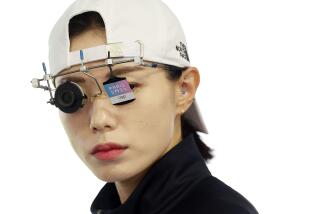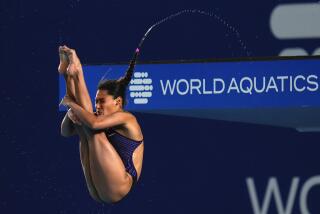Life’s Twists Turn for Soldati at 30
- Share via
The scars on her body detail the diving career of Kimiko Hirai Soldati. They might also represent symbols of her strength.
The jagged line that stretches over her right kneecap is what’s left of her first surgery, the one that ended her promising gymnastics career but not her hopes of becoming an Olympian.
And the dime-sized marks on her right shoulder mark the four attempts to repair injuries that have repeatedly kept her grounded over the last nine years.
But dealing with pain is something Soldati has learned to master. She had prime examples while growing up in Colorado. Her father, Gary Hirai, was born in a Japanese internment camp in Idaho during World War II and her mother, Judy, fought breast cancer for eight years before dying in 1991 at age 43.
Through it all, Soldati did not sway from her goal of making the Olympic journey, even if pain came along for the ride.
“I’m feeling really confident,” said Soldati, who at 30 will try in her first Olympics to become the oldest U.S. female diver to win a medal. “I’ve just got to get my body healthy.”
Soldati won her specialty, the three-meter springboard competition, Saturday at the Speedo National Diving Championships at the Mission Viejo Recreation Center, but said she needed two cortisone injections to stem the shoulder pain she was feeling after Wednesday’s semifinals.
Although it was hardly the most important event of the summer, it one was of her better efforts.
“I’m so proud of her,” said Kenny Armstrong, her coach at the U.S. training center in The Woodlands, Texas. “Mainly because she showed how tough she is today.”
She first injured the shoulder in 1995 while at Indiana, landing awkwardly on her first dives from a 10-meter platform. She ignored the injury long enough to win an NCAA title the next year, but during the 1996 Olympic trials was diagnosed with a torn biceps.
More shoulder injuries hampered her qualifying efforts for the 2000 Games. But she persisted, moving to Magnolia, Texas, shortly after the Sydney Olympics to train under Armstrong, who is credited with the development of Laura Wilkinson, a 2000 Olympic gold medalist in the women’s 10-meter platform, along with a handful of other Olympians.
Soldati was named athlete of the year by USA Diving in 2001 and 2002. She underwent her fourth major shoulder surgery last fall to repair scar tissue and recovered in time to prepare for last month’s Olympic trials. As the oldest competitor, her experience helped her pull out a victory on her final dive in the three-meter springboard competition, securing one of 11 spots on this year’s Olympic diving team.
“I was absolutely awash with emotion,” Soldati said. “All of the surgeries and countless days I couldn’t dive, then to see it happen.... “
Wilkinson, Soldati’s teammate at the training center in The Woodlands and her synchronized diving partner, said she brings more to the team than simply an acute diving ability.
“She’s such a good role model,” Wilkinson said. “She cares so much about people ... always has great advice. She’s one of the greatest people ever.”
Soldati said she draws strength from her faith, her husband, Adam Soldati, and her parents.
Judy Hirai died the summer before Soldati’s senior year of high school. She began wearing her mother’s gold wedding band when she married Adam, a former college coach, in 2000.
She switches the ring from her left hand to her right when diving, allowing more comfort when interlocking her hands.
On the few occasions when her 89-year-old grandmother, Mae, mentions her family’s three-year stay at internment camps, where Gary was born in 1945, bad feelings don’t fester. She has never heard her relatives complain about being sent to internment camps along with thousands of other Japanese-Americans after the attack on Pearl Harbor even though her grandparents were born in the U.S. and had purchased a home in Seattle.
“Looking back, it was certainly a dark period in our country’s history,” Soldati said. “But I’m always amazed at how my family has not passed on any bitterness. We’re proud to be a Japanese-American family, which at one time was put in an internment camp but has emerged to represent the U.S. in the Olympics.”
Soldati, whose was born Kimberly Mae Hirai but quickly adopted a nickname from her father, was born in Longmont, Colo.
She began diving in high school after the end of her gymnastics career, then continued her career at Colorado State.
It wasn’t until Soldati was a freshman in college that she began competing in the three-meter springboard. The next year she transferred to Indiana, where she met her future husband.
After watching Wilkinson win gold at the 2000 Games, Soldati decided to move to Texas to train with Armstrong, the U.S. national team coach since 1989. Adam Soldati had an established coaching career in Indiana but “didn’t bat an eye” when Soldati told him of her wish to move to Texas. He soon followed and resumed his career at the training center.
“I couldn’t have done this without the super support of my husband,” Soldati said. “We speak the same language, and he completely understands the sacrifices that need to be made.”
Even with Wilkinson returning, some believe Soldati has the best chance among U.S. women of winning a diving medal.
“I look at [my age] as an advantage,” she said. “I’m a lot more emotionally balanced. I realize that diving is not who I am, it’s what I do. It’s hard for a lot of athletes to get there.”
Any disadvantages?
“I’m a little beat up,” she said with a smile.
More to Read
Go beyond the scoreboard
Get the latest on L.A.'s teams in the daily Sports Report newsletter.
You may occasionally receive promotional content from the Los Angeles Times.






